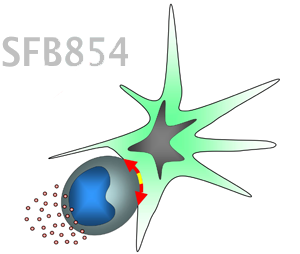Scientists of the CRC 854 reported a new therapy method targeting one of the most feared complications after hematopoietic stem cell transplants (HSCT) for the first time in the international journal Nature Communications.
Currently, HSCT allows an efficient therapy against many malign diseases, for example hematopoietic malignant tumors, which include leukemia in addition to other diseases. But HSCT often results in another disease, which is characterized by a severe and potentially fatal autoimmune complication. "Graft versus Host Disease" (GvHD) is well known and is not treatable for most patients. The research by the authors from the Institute of Clinical Chemistry and Pathiobiochemistry of the University Hospital Magdeburg shows a potential new therapy; the coagulating protease protein C (aPC) can stop this dangerous reaction.
The current results are based on a new insight in the regulation of immune cells. "We can now show that the blood coagulation system directly regulates the immune response. With this, we can prove the existence of a new mechanism with which the immune system can be controlled. We think that these results could be the basis for a new therapy for immunological diseases such as GvHD," according to Prof. Dr. med. Berend Isermann, head of the study and the director of the Institute for Clinical Chemistry and Pathochemistry. "These findings may drastically change our understanding of the field, since we have found a new mechanism to control an inappropriate immune response," said Dr. Satish Ranjan, lead author of the study, who carried out the experiments together with the other coauthors.





